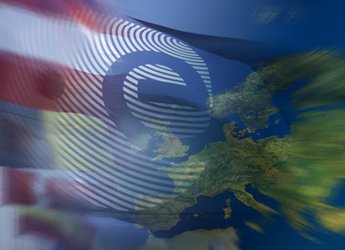European Ministers inject new impetus to ensure space’s role as a key asset in facing global challenges
ESA PR 47-2008. The Ministers in charge of space activities in the ESA's 18 Member States and Canada today concluded a successful two-day Council meeting in The Hague, agreeing to undertake new initiatives in several fields and endorsing the next phases of a set of ongoing programmes.
Today’s decisions are a further step towards giving Europe the means to respond to global challenges. In keeping with the European Space Policy, designed in cooperation with the European Commission, the measures will further strengthen Europe’s role in the development and exploitation of space applications serving public policy objectives and the needs of European citizens and enterprises.

These decisions have particular relevance at the present time, showing as they do Europe’s determination to invest in space as a key sector providing for innovation, economic growth, strategic independence and the preparation of the future.
Recognising that space is a strategic asset and that it is of fundamental importance for the independence, security and prosperity of Europe, the Ministers also adopted four Resolutions:
- first, “The role of Space in delivering Europe’s global objectives”, covering the political and programmatic highlights of the Council;
- second, a resolution establishing the Level of Resources for the Agency to cater for Space Science programmes and basic activities in the period 2009-2013;
- third, the renewal of the contribution of ESA Member States to the running costs of the Guiana Space Centre - Europe’s spaceport in French Guiana (South America); and
- fourth, a resolution outlining the future evolution of the Agency, spanning its financial management reform, decision-making processes, industrial and procurement policies and the further development of site infrastructures for ESA programmes.
Decisions on programmes/activities

On the programmatic side, the Ministers took decisions concerning the full range of the Agency’s mandatory and optional programmes:
The decisions taken concern the following:
a) The Agency’s mandatory activities:
- Funding of the Level of Resources for 2009-2013 covering the Scientific Programme and basic activities.
b) Continuation of ongoing optional programmes and start of new programmes:
Subscriptions for the Launcher programmes, including funding of the Guiana Space Centre, Ariane 5 and Vega accompaniment technology programmes, Ariane 5 evolution and the future launchers preparatory programme.
Subscriptions for the Earth Observation activities, including the second segment of the Global Monitoring for Environment and Security Space Component programme, the Meteosat 3rd generation development programme and a novel Climate Change Initiative on the provision of essential climate variables.
Subscriptions for the human spaceflight, microgravity and human exploration programmes including exploitation and evolution of the International Space Station, on-board research in life and physical sciences and definition studies on the evolution of a returnable transfer vehicle.
Subscriptions to robotic exploration programmes (the ExoMars programme and preparatory activities on future Mars robotic exploration).
Subscriptions for Advanced Research in Telecommunications Systems (ARTES), focusing on technologies, applications and mission demonstrations and including preparatory work for a European Data Relay System (EDRS), an air traffic management satellite system (Iris) and Integrated Application Promotion combining usage of telecommunications, Earth observation and navigation satellite systems with terrestrial information and communications systems.
Subscriptions for the programme on the evolution of the European Global Navigation Satellite System, to continue the improvement of Galileo.
Subscription to the start of a Space Situational Awareness programme to provide the information to help protect European space systems against space debris and the influence of adverse space weather.
- Subscription to the continuation of the General Support Technology programme to provide in a timely way technologies for a wide range of new space programmes.
Space is an enabling tool which gives European decision-makers the ability to respond to critical challenges such as global climate change and global security. It brings a significant contribution to Europe's growth and employment; it provides indispensable enabling technologies and services for the knowledge society; it increases the understanding of our planet and Universe; and it contributes towards European identity, cohesion and security, providing inspiration for future human potential and bringing young people into scientific and technical education.
Through this meeting the ESA Ministers have seized the opportunity to capitalise on the recent successes and achievements of Europe in space and to translate the political impetus into new programmes able to deliver knowledge, services and competitiveness and to shape ESA to assert itself as a global space agency, indispensable to the world in contributing to global policies.
Note for editors
For further background information on the programmatic aspects, see ESA PR 44-2008
Or contact:
Franco Bonacina
ESA Spokesman and Head of Media Relations Office
Communications and Knowledge Department
Tel: + 33 (0)1 53 69 72 99
e-mail: franco.bonacina@esa.int







